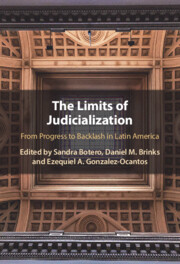Book contents
- The Limits of Judicialization
- The Limits of Judicialization
- Copyright page
- Contents
- Figures
- Tables
- Contributors
- Acknowledgments
- 1 Working in New Political Spaces
- 2 Critical Disconnects
- 3 When Winning in the Courts Is Not Enough
- 4 Forms of Countermovement and Counter-Reform in Latin America
- 5 Backlash against State Strengthening Reforms
- 6 Backlash against Corporate Accountability for Grave Human Rights Violations in Colombia
- 7 Courting Judicial Legitimacy
- 8 Family Ties and Nepotism in the Mexican Federal Judiciary
- 9 Judicial Corruption
- 10 Kickbacks, Crackdown, and Backlash
- 11 Turning Corruption Trials into Political Tools in the Name of Transparency
- 12 Fighting Corruption, Dismantling Democracy
- 13 Prosecutorial Agency, Backlash and Resistance in the Peruvian Chapter of Lava Jato
- Index
- References
12 - Fighting Corruption, Dismantling Democracy
Antagonism, Communication, and the Political Use of Lava Jato in Brazil
Published online by Cambridge University Press: 11 August 2022
- The Limits of Judicialization
- The Limits of Judicialization
- Copyright page
- Contents
- Figures
- Tables
- Contributors
- Acknowledgments
- 1 Working in New Political Spaces
- 2 Critical Disconnects
- 3 When Winning in the Courts Is Not Enough
- 4 Forms of Countermovement and Counter-Reform in Latin America
- 5 Backlash against State Strengthening Reforms
- 6 Backlash against Corporate Accountability for Grave Human Rights Violations in Colombia
- 7 Courting Judicial Legitimacy
- 8 Family Ties and Nepotism in the Mexican Federal Judiciary
- 9 Judicial Corruption
- 10 Kickbacks, Crackdown, and Backlash
- 11 Turning Corruption Trials into Political Tools in the Name of Transparency
- 12 Fighting Corruption, Dismantling Democracy
- 13 Prosecutorial Agency, Backlash and Resistance in the Peruvian Chapter of Lava Jato
- Index
- References
Summary
This chapter investigates affinities between Bolsonarismo (the discourse of groups supporting Jair Bolsonaro’s government and ideas) and Lavajatismo (the discourse of groups supporting the Lava Jato investigation) both online and offline from 2015 to 2019. The analysis shows the links between the denial of rights, the push for accountability through the courts, and the far right, combining two original data sources. First, semi-structured interviews were conducted with members of the so-called verde e amarelos (“green and yellow”) during mass anti-corruption demonstrations in 2015 and 2017. Participants at these rallies were characterized by the use of the Brazilian yellow jersey as a symbol of nationalism, “anti-communism,” and anti-corruption. Second, the results are presented of a lexical analysis of 13,800 posts on Facebook pages supporting Lava Jato, between April 2016 to February 2019. This period included former President Dilma Rousseff’s impeachment, former President Luiz Inácio “Lula” Da Silva’s imprisonment, and Jair Bolsonaro’s rise to power.
- Type
- Chapter
- Information
- The Limits of JudicializationFrom Progress to Backlash in Latin America, pp. 289 - 313Publisher: Cambridge University PressPrint publication year: 2022
References
- 3
- Cited by

